Every show has its supposed “main” character, they get the promos, the plotlines, and usually, the emotional growth arc. But sometimes, out of the shadows of the script steps a side character so magnetic, so attention-grabbing, they leave the lead looking like background noise. These are the characters fans quote more, meme harder, and secretly and often not-so-secretly root for. Stranger Things, for example, yes, it’s Eleven who has the superpowers and a heartbreaking backstory to go with it, yet it was Steve Harrington, the reformed bad boy turned babysitter of the year, who had fans screaming “protect Steve at all costs.”
Or in The Good Place, where Eleanor is the central protagonist, however, it is Michael, the show’s 'reformed demon daddy,' whose endearing and occasional satirical evilness makes him a standout in the series. Sometimes, it's the snarky best friend, the mysterious neighbor, or the comic relief who captures our hearts. These characters weren’t meant to be the stars in their shows, but cemented themselves as icons in fan forums and TV history. In this list, we celebrate seven such scene-stealers who came in with a few lines and left with a lasting impact on the whole show. Buckle up, as we count down the 7 times the side characters overshadowed their main counterparts.
Disclaimer: This article is based on the writer's opinion. Reader's discretion is advised.
Frenchie from The Boys
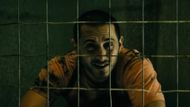
The Boys’ universe is full of chaos, corruption, and supes who think they’re gods. In the middle of all this violent madness stands Serge, better known as Frenchie, played by Tomer Capone, the gun-slinging, emotionally complex wildcard of the pivotal group. Kicking off the show as an anarchist and weapons expert, with a particular flair for chemistry, Frenchie could’ve easily remained a gritty background character, but Tomer Capone’s performance infused the character with such soulful vulnerability and unexpected tenderness that he quickly became the emotional glue of the team.
One moment he's improvising explosives, the next he's crying while watching “The Sound of Music.” “I do not want to ‘fix’ you. I just want you to be…”Frenchie’s relationship with Kimiko (Karen Fukuhara) gave the show one of its most emotionally grounded arcs. Abused and captured, he helped Kimiko's rehabilitation, and their storyline soon became an instant fan favorite. While Frenchie didn't have as much screen time as some of the other titular characters of the show, his on-screen presence is highly compelling. Whether he’s making one of his snarky one-liners or being haunted by the flashbacks as a man running from his violent past, Frenchie is the beating heart of The Boys.
Mike Ehrmantraut from Breaking Bad
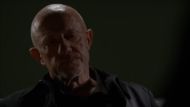
In a show defined by moral descent and the rise of evil empires, one man stood tall and silent as the ultimate stoic badass, Mike Ehrmantraut, played by Jonathan Banks. First appearing in season two of Breaking Bad, Mike was supposed to be a temporary character. But Jonathan Banks’ deadpan delivery, world-weariness, and grizzled presence made him impossible to ignore. By the time he became a mainstay, it felt like Breaking Bad had found its emotional compass. While Walter White (Bryan Cranston) spun deeper into darkness, Mike, a former cop turned fixer for Gus Fring, remained steadfast, strategic, and surprisingly paternal.
His dynamic with Jesse Pinkman (Aaron Paul) gave the show a low-key cop show energy, full of dry humor and unexpected kindness. The flashbacks Mike gets in Better Call Saul reinforce Mike’s narrative and give the audience a peek into the tragedy that shaped him. He's just a father, haunted by the murder of his son, trying to protect his granddaughter and do right in a world that just won't allow it. His death, inevitable yet infuriating, remains one of the show’s most haunting moments. “Shut the f*** up and let me die in peace,” he mutters to Walt. A quiet warrior’s final words, and a mic drop that echoed across seasons.
Steve Harrington from Stranger Things
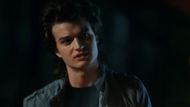
“I may be a pretty shitty boyfriend, but turns out I’m actually a pretty damn good babysitter.” Steve Harrington, played with a charmingly lovable energy, is portrayed by Joe Keery. Starting out as the typical 80s teen drama cliché, as the popular jock boyfriend who's a bit of a tool, Steve's character was initially set to be written off after the first season. However, the Duffer Brothers decided to switch Lonnie (Jonathan and Will's dad) with Steve to be a part of the iconic trio with Nancy and Jonathan, in their fight against the Demogorgon. The show gave his character one of the best storylines in the history of television, and by the end of season one, Steve had fought off a fully grown Demogorgon with his signature nail-spiked bat.
It was an uphill battle for Harrington, but he just kept climbing and soon was winning hearts across the fandom. Whether it be his memorable bond with Dustin (Gaten Matarazzo), his cool and humorous misadventures with the central kid protagonists, or his classic duo with Robin, Steve became the unsung hero and emotional anchor of the series. He isn’t the smartest or strongest, but he's the guy who always shows up, no matter how outmatched he is. Joe Keery’s comic timing and heartwarming chemistry with the younger cast gave Steve a second life. While the core plot revolves around Eleven and the Upside Down, it’s Steve’s redemptive arc that gives the show its pulse.
Eric Effiong from Sex Education
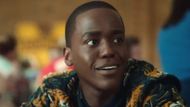
If Sex Education is about Otis Milburn (Asa Butterfield) learning how to navigate his own awkwardness, Eric Effiong is the unapologetic burst of joy, chaos, and raw honesty the show needs like the living need oxygen. Played by the absolutely magnetic Ncuti Gatwa, Eric is Otis’s best friend and the moral center of the show. But he's not written as the stereotypical "gay best friend." Eric is layered, vulnerable, hilarious, and constantly evolving, and from sequined outfits to emotional breakdowns, he carries his identity with pride, but also pain. His journey of self-acceptance, from hiding behind flashy costumes to facing religious conservatism and toxic love, hits the viewers like a freight train.
“You can't raise me up and then abandon me,” he tells Adam (Connor Swindells) during a breakup, tears in his eyes. It’s a moment that perfectly captures his strength and sensitivity. Ncuti Gatwa brings such kinetic energy to every scene, whether he’s lip-syncing to “I Want to Dance with Somebody” or confronting his own community and culture, Eric is never anything less than unforgettable. Though he wasn't the main character of the show, his supporting role as Eric was a career-defining one. Gatwa’s portrayal was so electric, it eventually landed him the Doctor Who mantle, making history in the process.
Seth Cohen from The O.C.
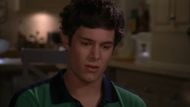
In a world of shirtless beach jocks and dramatic love triangles, Seth Cohen strolled in with his awkward boyish charm and comic books in tow, and rewrote the trope of teen heartthrobs. Played with jittery allure by Adam Brody, Seth wasn’t supposed to be ‘The guy’; that was Ryan Atwood’s (Ben McKenzie), the brooding bad boy from Chino with a heart of gold. But week after week, Seth stole scenes, storylines, and the hearts of fans. It wasn't just his sarcastic one-liners, but the earnest vulnerability underneath them. Seth wasn’t just a wisecracking sidekick, he was a full-blown, fleshed-out character who reflected the inner monologue of every nerdy kid watching.
He made being a comic book geek not just tolerable, but cool. The O.C. wasn’t just about the trials of rich Orange County teens anymore; it represented the youth more holistically, all courtesy of Cohen. When Seth finally got the girl, Summer Roberts (Rachel Bilson), it wasn’t just a romantic payoff, but the triumph of the underdog. Their dynamic sparkled, capturing a tone of whimsical sincerity that grounded the show amidst its soapier elements. Ryan might have been punching out problems, but Seth was narrating them with flair. As the seasons progressed, it became clear that Seth wasn't riding shotgun; he was building his own lane, complete with a Death Cab for Cutie soundtrack and an impeccable hoodie collection.
Michael from The Good Place
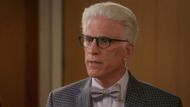
"Check it out. Suspenders! So dumb. So much dumber than belts." When The Good Place launched, Eleanor Shellstrop (Kristen Bell) was the obvious protagonist. A hot mess of bad decisions, dumped into a suspiciously cheerful afterlife. But the show’s most surprising and compelling evolution came not from Eleanor’s moral growth, but from Michael, the architect of the titular "Good Place" turned reluctant savior of humanity. Played by the incomparable Ted Danson, Michael began as a dapper celestial bureaucrat with a love for bowties and existential torture. But as the series unspooled its high-concept twists, Michael transformed in ways no one could’ve predicted.
"Now we're going to do the most human thing of all, attempt something futile with a ton of unearned confidence and fail spectacularly!"
Danson’s performance was a masterclass in tonal balance. One moment, he was gleefully evil, gleaming with delight at an endless shrimp cocktail pun, and the next, he was tearfully defending humanity’s potential for goodness. By Season 3, Michael wasn’t just part of the gang, his transformation became the central message of the show. While Eleanor, Chidi (William Jackson Harper), Tahani (Jameela Jamil), and Jason (Manny Jacinto) were trying to get into the Good Place, Michael was trying to deserve to be there. He became a reflection of what the show ultimately argued, that people and even demons aren’t defined by their pasts, but by the choices they make in the here and now. Michael wasn’t the main character by design. But by the end, he was the one viewers rooted for most, and when he finally got to live among humans, smiling as he said the culminating line of the show, “Take it sleazy,” it felt like the show could not have had a more perfect end.
Barney from How I Met Your Mother
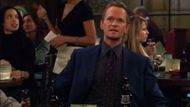
If How I Met Your Mother had been titled How Barney Became the Main Character, it might’ve been a more accurate reflection of what unfolded over nine seasons. While Ted Mosby (Josh Radnor) droned on about destiny and yellow umbrellas, it was Barney Stinson who truly captured the imagination of audiences. Played with electric charisma by Neil Patrick Harris, Barney was originally intended to be the comic relief, the outrageous, overse*ed, suit-wearing playboy, but by Season 2, it was clear, Barney was the show. His catchphrases became cultural currency, and his elaborate pickup lines and playbook antics were both horrifying and hilarious.
But what elevated Barney beyond the trope of the "lovable womanizer" was the nuance Harris brought to the role, and the show’s surprising willingness to explore the pain behind the punchlines. The series slowly unravels the origins of the Barney persona, his heartbreak, crushed idealism, and a man who rebuilt himself into an untouchable fortress of cool. It was a layered revelation that gave context to the character. Even when the show’s finale polarised fans by tearing apart what felt like years of growth, there’s no denying that Barney stole every scene he was in. From laser tag to magic tricks, from emotional breakdowns to surprisingly mature mentorship moments, Barney’s arc wasn’t just showy, it was transformational. Ted may have told the story, but it was Barney who made it worth hearing.
